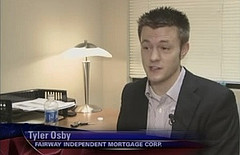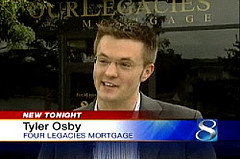I’ve spent days pondering how to make this as funny as Stephen Colbert’s hilarious segment ‘Better Know a District’. Very quickly, I realized that his humor is in his interviewing… so I guess I’m out of luck in that respect. However, I do know that too often terminology is used in the mortgage industry (much like other industries) where people assume that you know what their talking about. I’m here to make these commonly used terms and make them easier to understand and explain. So, here’s your first edition of Wealth With Mortgage’s ‘Better Know a Mortgage Term’.
Have you ever heard the term ‘Jumbo Loan’ and not understood what it was? Why it costs more to get one? Why the guidelines are different to qualify for one? Well, you’re not the only one and I’m here to hopefully set the record straight!
Quickly defined, (via wikipedia) a jumbo mortgage is a loan with a loan amount above the industry-standard definition of conventional conforming loan limits.
Loan limits are set by Fannie Mae and Freddie Mac, two government sponsored enterprises of the US Government. These limits are re-assessed every year by looking at the mean sales prices across the country. If prices increase, a limit increase is seriously considered. There are also areas designated as ‘High Cost Areas’ that have a higher limit set for borrowing, specifically 50% higher than the other parts of the country. As of January 2008, these high cost areas are Alaska, Hawaii, Virgin Islands and Guam.
 The most often asked question I get in the mortgage industry (related to this topic) is ‘Why does it cost more to get a jumbo loan?’ (normally referring to the interest rate). Well… if you ask a loan officer in my business this question and they simply say ‘It’s a higher risk loan, so the lender assess a higher risk to you’ or an answer similar to this, they don’t understand the right answer. Understanding where mortgage money comes from is what leads you to the RIGHT answer.
The most often asked question I get in the mortgage industry (related to this topic) is ‘Why does it cost more to get a jumbo loan?’ (normally referring to the interest rate). Well… if you ask a loan officer in my business this question and they simply say ‘It’s a higher risk loan, so the lender assess a higher risk to you’ or an answer similar to this, they don’t understand the right answer. Understanding where mortgage money comes from is what leads you to the RIGHT answer.
Mortgage money comes from a secondary market. At the end of the day, the lenders only have so much of their own money (a.k.a warehouse lines) that they can use. They have to free up their capital so they can keep closing new business. So, they go to wall street to convert the closed mortgages into mortgage backed securities (MBS). Wall street’s job is to convert the mortgages into securities and they will assess you a fee for doing it each time. Well, logically if you have TONS of loans to convert, the fee is VERY small on each individual loan. Using the same logic, if you have a smaller group of loans going to wall street, the incremental cost is larger. This is why you see a .25 to .50% higher rate on a jumbo loan. Good stuff huh!!?
Now, back to the question of risk. Yes, a jumbo loan CAN be more risky. This is why guidelines are often much different when qualifying for a jumbo loan. Sometimes you have to have a lower debt ratio, higher credit score or even more money down. I would address specific guidelines, but honestly – they can change almost weekly nowadays, so it wouldn’t be accurate anyway!
Now go to the water cooler and impress your friends and co-workers with your new mortgage knowledge!
Please let me know if you’d like to have a term defined on the next edition of ‘Better Know a Mortgage Term’!









